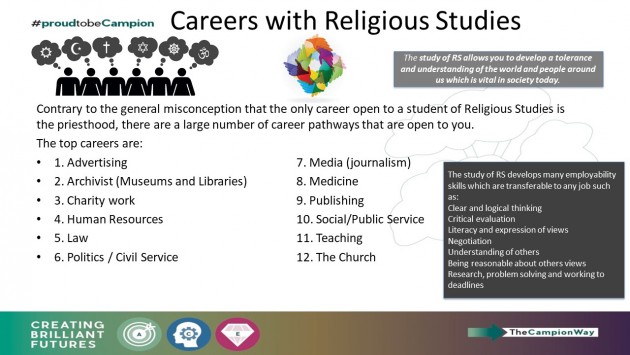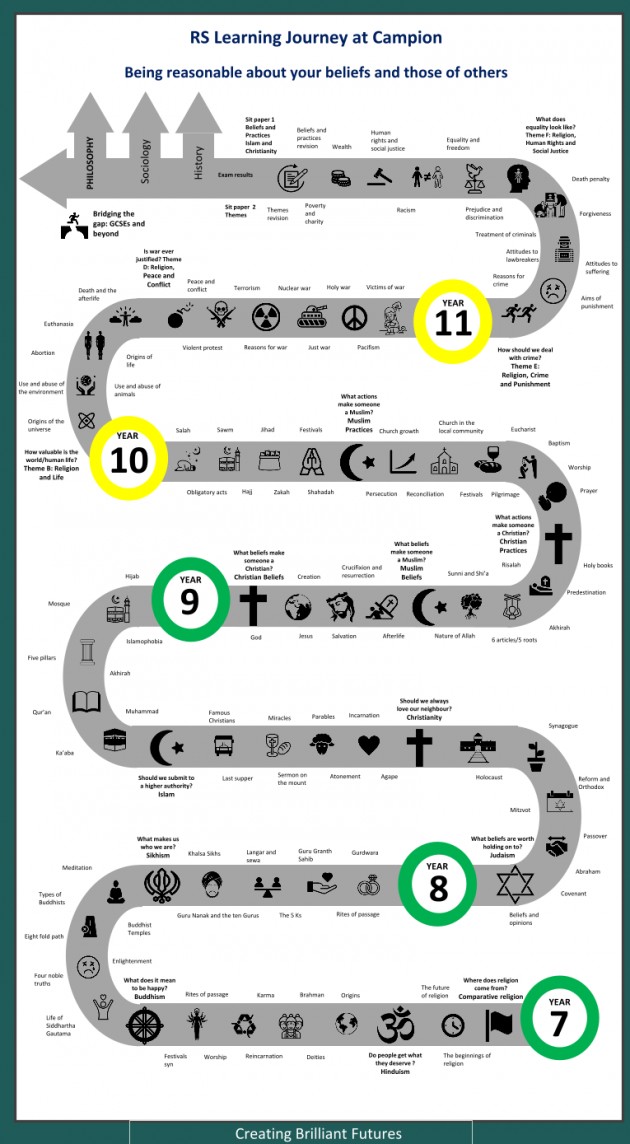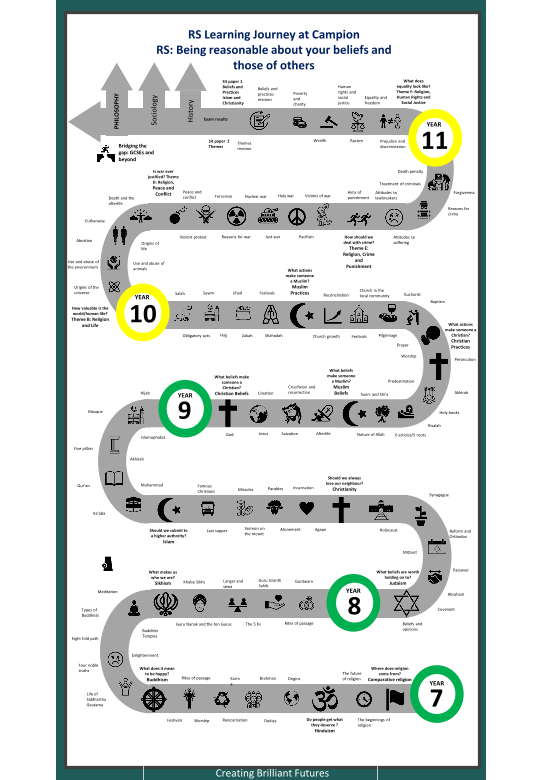Religious Studies

Statement of Intent
The key aim of Religious Studies is to enable every young person to gain an understanding of religions and give them the opportunity to reflect on and evaluate a variety of world views. Religious Studies contributes to education at Campion School by provoking challenging questions about meaning and purpose in life through the study of religions and worldviews. Students learn about and from religions and worldviews in local, national and global contexts and learn to weigh up the value of wisdom from different sources by being reasonable about their own beliefs and the beliefs of others. In doing this, they learn to articulate clearly and coherently their personal beliefs, ideas, values and experiences while respecting the right of others to differ.
The curriculum in Religious Studies should encourage growth of knowledge and understanding within a range of religions and worldviews and enable students to develop an aptitude for dialogue. This enables students to participate positively in our society with its diverse religions and worldviews. In addition to its contribution as an academic discipline, RS offers distinctive opportunities to promote students’ spiritual, moral, social and cultural development by providing a structured and safe space for reflection, dialogue and debate.
Curriculum Map
2021 - 2022
2022 - 2023
Key Stage 5
The department offers Philosophy A level
|
|
Autumn |
Spring |
Summer |
|
Year 12 |
Epistemology: Definition of knowledge including JTB, Gettier and responses Moral Philosophy: Utilitarianism, the issues surrounding it and application to ethical issues; Kantian deontological ethics, the issues surrounding it and application to ethical issues
|
Epistemology: Perception including the issues surrounding direct and indirect realism and idealism; Reason as a source of knowledge including the issues surrounding innatism and empiricism. Moral Philosophy: Aristotelian virtue ethics, the issues surrounding it and application to ethical issues; Applied ethics. |
Epistemology: The limits of knowledge including Descartes' scepticism and the responses to it. Moral Philosophy: Meta-ethics including moral realism and moral anti-realism |
|
Year 13 |
Metaphysics of the Mind: Substance dualism including criticisms of Descartes' arguments, Property dualism including Philosophical Zombies and the Mary argument and criticisms of these arguments, Issues with substance dualism including category mistake and empirical and conceptual problems with interaction, Metaphysics of God: The concept and nature of God, teleological arguments, cosmological arguments
|
Metaphysics of the Mind: Soft and hard behaviourism and criticisms of these theories, mind-brain type identity theory and criticisms of this theory, eliminative materialism and criticisms of this theory, Metaphysics of God: Ontological arguments and the problem of evil
|
Metaphysics of the Mind: functionalism and criticisms of this theory, Metaphysics of God: Religious Language, consolidation of Year 12 and 13 learning in long term memory
|
Religious Studies is a core compulsory subject that is taught to all students in Key Stage 3 and 4.
Students in Key Stage 3 will study the Six Major World Religions as shown on the Learning Journey.
Students will begin their Key Stage 4 GCSE study in Year 9 and will sit their exam in Year 11.
We follow the AQA Religious Studies A GCSE focusing on the Christianity and Islam and the study of 4 Themes, detailed on the Learning Journey.
At Key Stage 5 we offer AQA A Level Philosophy
Students will:
- develop their knowledge and understanding of religions and non-religious beliefs, such as atheism and humanism
- develop their knowledge and understanding of religious beliefs, teachings and sources of wisdom and authority, including through their reading of key religious texts, other texts and scriptures of the religions they are studying
- develop their ability to construct well-argued, well-informed, balanced and structured written arguments, demonstrating their depth and breadth of understanding of the subject
- reflect on and develop their own values, belief, meaning, purpose, truth and their influence on human life
- reflect on and develop their own values, beliefs and attitudes in the light of what they have learnt and contribute to their preparation for adult life in a pluralistic society and global community.
CAREER OPPORTUNITIES:

Head of Faculty




